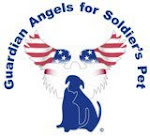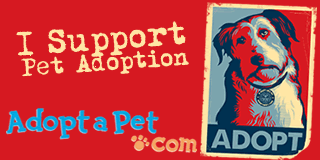via ASPCA:
On October 6, a team of ASPCA animal behavior experts arrived in Beaufort, S.C., to conduct behavior assessments of more than 80 dogs living in Marine Corps housing units in the South Carolina Tri-Command area.
The visit by ASPCA behaviorists comes after these dogs became the subject of a breed ban recently instituted by Marine Corps headquarters. The policy specifically bans purebred and mixed-breed Pit Bulls, Rottweilers and wolf hybrids, as well as canines with "dominant traits of aggression" who pose a risk to people living in U.S. Marine Corps housing worldwide.
“Our goal in coming to the Parris Island base is to make sure safe dogs and their families are able to stay together,” says Dr. Emily Weiss, ASPCA Senior Director of Shelter Research & Development, “and so far, the results have been positive."
After assessing individual canines with SAFER (the ASPCA Safety Assessment for Evaluation Rehoming)—a research-based tool that helps identify the likelihood of canine aggression—ASPCA behaviorists report that of the 85 dogs assessed to date, only two were found to have a high enough potential for aggression to have to be removed from the base. "Two others showed aggressive tendencies, but one will work with a trainer and another will be neutered," comments Dr. Weiss. “The vast majority, however, are well-loved, well-behaved family pets.”
"Breed bans just don't work," continues Dr. Weiss, "These breeds of dogs have a bad rap. In most cases, they are safe, wonderful animals. We're hoping that we can work with the Marine Corps over the next two years to show them that we should be testing the aggression level of individual dogs and not just banning these three breeds. It's breed prejudice."
The families of safe dogs will be given the opportunity to apply for a waiver, allowing their dog to remain on the base until 2012. "We're very excited about the ASPCA’s assessment," says Army Capt. Jenifer Gustafson, the Officer in Charge of the veterinary clinic on Parris Island. "This is a welcome alternative to the unpleasant possibility of pet parents being forced to give up their dogs or leave base housing.”
The ASPCA is opposed to breed bans, which target entire breeds instead of focusing on individual dogs. Aggressive canines are often the result of owners failing to provide proper training. Our organization continues to work on identifying potential aggression in individual dogs, opening up opportunities for behavior modification. Read more about alternatives to breed-specific laws.
After the jump: see "Are breed -specific laws (bans) effective?" "Alternatives to breed-bans," and some facts about dog aggression you might not know.
via ASPCA
Are Breed-Specific Laws Effective?
There is no evidence that breed-specific laws—which are costly and difficult to enforce—make communities safer for people or companion animals. For example, Prince George’s County, MD, spends more than $250,000 annually to enforce its ban on pit bulls. In 2003, a study conducted by the county on the ban’s effectiveness noted that “public safety is not improved as a result of [the ban],” and that “there is no transgression committed by owner or animal that is not covered by another, non-breed specific portion of the Animal Control Code (i.e., vicious animal, nuisance animal, leash laws).”
Following a thorough study of human fatalities resulting from dog bites, the United States Centers for Disease Control (CDC) decided not to support BSL. The CDC cited, among other problems, the inaccuracy of dog bite data and the difficulty in identifying dog breeds (especially true of mixed-breed dogs). The CDC also noted the likelihood that as certain breeds are regulated, those who exploit dogs by making them aggressive will replace them with other, unregulated breeds.
What’s Wrong with Breed-Specific Laws?
BSL (breed specific laws) carry a host of negative and wholly unintended consequences:
•Dogs go into hiding
Rather than give up their beloved pets, owners of highly regulated or banned breeds often attempt to avoid detection of their “outlaw” dogs by restricting outdoor exercise and socialization and forgoing licensing, microchipping and proper veterinary care, including spay/neuter surgery and essential vaccinations. Such actions have implications both for public safety and the health of these dogs.
•Good owners and dogs are punished
BSL also causes hardship to responsible owners of entirely friendly, properly supervised and well-socialized dogs who happen to fall within the regulated breed. Although these dog owners have done nothing to endanger the public, they are required to comply with local breed bans and regulations unless they are able to mount successful (and often costly) legal challenges.
•They impart a false sense of security
Breed-specific laws have a tendency to compromise rather than enhance public safety. When limited animal control resources are used to regulate or ban a certain breed of dog, without regard to behavior, the focus is shifted away from routine, effective enforcement of laws that have the best chance of making our communities safer: dog license laws, leash laws, animal fighting laws, anti-tethering laws, laws facilitating spaying and neutering and laws that require all owners to control their dogs, regardless of breed.
What’s the Alternative to Breed-Specific Laws?
In the aforementioned study, the CDC noted that many other factors beyond breed may affect a dog’s tendency toward aggression—things such as heredity, sex, early experience, reproductive status, socialization and training. These last two concerns are well-founded, given that:
•More than 70 percent of all dog bite cases involve unneutered male dogs.
•An unneutered male dog is 2.6 times more likely to bite than is a neutered dog.
•A chained or tethered dog is 2.8 times more likely to bite than a dog who is not chained or tethered.
•97 percent of dogs involved in fatal dog attacks in 2006 were not spayed/neutered:
•78 percent were maintained not as pets, but rather for guarding, image enhancement, fighting or breeding. \
•84 percent were maintained by reckless owners—these dogs were abused or neglected, not humanely controlled or contained, or allowed to interact with children unsupervised.
Recognizing that the problem of dangerous dogs requires serious attention, the ASPCA seeks effective enforcement of breed-neutral laws that hold dog owners accountable for the actions of their animals.
For help in drafting animal control laws, contact the ASPCA’s Government Relations department at lobby@aspca.org.
xoxo
skip to main |
skip to sidebar
A good dog is an oasis in a troubled world.

St. Francis, Patron Saint of this blog



A blog that advocates for shelter dogs and animals in general
Now more than ever, you are needed to donate your old blankets, towels, and sheets to your local animal shelter. With financial cut-backs, repairs on shelters are often put off, so if it's drafty, the animals suffer. I know my shelter uses rags to stuff under doors. No kidding! Empty out those closets... this is your chance to get rid of stuff and do something useful!
Choosing a dog may be the only chance you have to choose a relative!
Followers
Got Soldier? This group fosters their pets while they are deployed!
A good dog is an oasis in a troubled world.
ANIMAL POISON HOTLINE
Save this number!
1.888.232.8870
Save this number!
1.888.232.8870

St. Francis, Patron Saint of this blog
Search This Blog
Good Orgs
Good Search
YOU SEARCH OR SHOP...
WE GIVE!
WE GIVE!
Blog Archive
-
▼
2009
(149)
-
▼
October
(40)
- Halloween Pics
- News Round Up
- What Would You Do For A Pigeon?
- Pet Talk: Pair's Wonderful Way With Disabled Anima...
- Cool Dachshund Video
- Halloween Events For You and Your Dog - NYC and LI...
- Keep Animals Out Of Labs or Regulate Sales to Thos...
- A Lousy Day
- Low Cost Spay/Neuter Mobile Clinic for cats, Oct. ...
- Victories And Disappointments
- Play Gone To The Dogs
- Two Good Adopt-A-Pit Bull Stories, in Honor of Pit...
- Charlie (the formerly blind Beagle) Gets Adopted F...
- Pit Bull Awareness Day - October 24th
- News Round Up
- Ennis, Texas Rescue Group Closing - Homes Needed F...
- Award Goes to ASPCA Forensic Vet for Work on Vick ...
- Pit Bull Event, Oct. 24th, in New Haven CT
- A Great Rescue Story via Rolling Dog Ranch (in bea...
- I'm sitting working on the blog and look who ge...
- Book Reading in Woodside, NY - "Buddy Unchained"
- Almost Home Animal Rescue and Adoption WALKATHON i...
- Adoption Event in Melville, NY Benefitting Little ...
- WHAT A GREAT EVENT! Sugar Bush Farms - Out Of The...
- Adopted!
- News Round Up
- Dog Saves Family From Fire
- Funny Dog Pics
- Cat Food Recall
- Two Adoption Events This Week
- New York Week For The Animals (Oct. 10-18th)
- Adopt a Little New Yorker Today
- Pilots N Paws -- another one for "Thank-God-This-E...
- US Marines Conduct Behavior Assessments As An Alte...
- News Round Up
- Day At The Shelter
- Another Good One From Rolling Dog Ranch
- Danny Bampton
- Westchester Pet Adoption Fair & Expo
- Can Cats and Dogs Catch Swine Flu?
-
▼
October
(40)

About Me

- dellbabe68
- To sit with a dog on a hillside on a glorious afternoon is to be back in Eden, where doing nothing was not boring - it was peace. ~Milan Kundera











